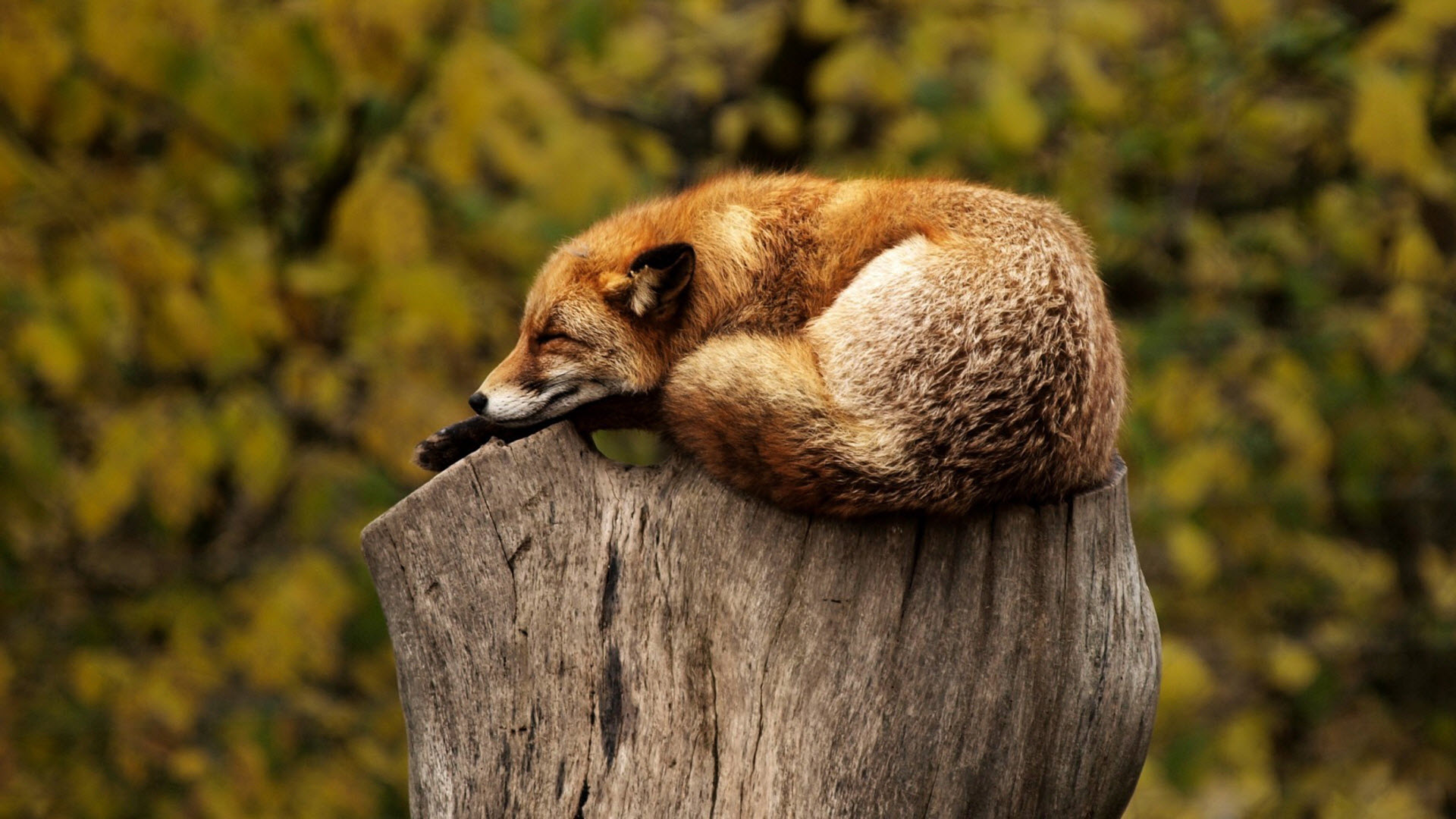Veganism: What and Why?
What Everyone Already Believes
Harming animals without good reason is wrong. Just about everyone feels this way. It’s something most of us learned at an early age and it’s something taught to children today. We all know that it would be wrong to kick a dog out of frustration, or to swat a bird’s nest out of a tree just to watch what happens, or to throw a cat into a lake for fun.
The idea that it’s wrong to unnecessarily harm animals is moral common sense. Because animals have lives of their own and experience pleasure and pain just like we do, it’s immoral to cause them harm when we don’t need to. It’s so obvious that no one would question it.
The way we live our lives, however, often conflicts with this basic belief we all share. Sure, we avoid kicking dogs and swatting birds’ nests out of trees. But there are many other ways we are causing terrible harm to animals every day. We cause tremendous suffering and death to animals for food, clothing, entertainment, and other purposes. And all of this harm is completely unnecessary and avoidable.
Fortunately, we have the option to stop harming animals unnecessarily. We can live up to our own moral standards. All we have to do is become vegan. It’s really that simple.
This may seem like a surprising, sudden, or extreme conclusion. So let’s slow down and have a closer look.
Sentient beings
Beings who can experience pleasure and pain are often referred to as “sentient.” A sentient being’s life can go better or worse, since she has a subjective experience of the world.
Animals (including humans) are sentient, whereas most other lifeforms, such as plants, are not.
V is for vegan
A vegan is someone with a lived commitment to not use or consume animals or animal products for any purpose, including food (e.g., dairy, honey, meat, bone-char refined sugar, eggs), clothing (e.g., silk, leather, wool), and entertainment (e.g., animal racing, hunting).
Veganism: Putting Our Beliefs Into Practice
We started out by highlighting something we all already believe: that it’s wrong to harm animals without good reason. From there, we concluded that we should all be vegan. You might be skeptical of the jump.
Harm
You might wonder just how much animals are truly harmed for things like food and clothing. In reality, the answer is clear and devastating. Using animals in the production of food and clothing involves forced confinement and emotional and psychological deprivation. It means tearing apart mothers and their children. It means suffocating countless billions of fishes and other aquatic creatures every year. And, of course, it involves the slaughtering of billions more land animals like chickens, turkeys, cows, and pigs. Meat, dairy, eggs, honey, leather, wool, silk, and all other animal products come from processes that involve enormous suffering, harm, and death.
What we do to animals for food and clothing is much worse than kicking dogs and throwing cats into lakes. And as long as we use animals for things like food, clothing, cosmetics, and entertainment, we will continue to cause them great harm and we will continue to kill them in staggering numbers.
Necessity
The sad fact of the matter is that we are causing vast harm and death to animals. But you might ask whether what we are doing is truly unnecessary. Isn’t that the difference between kicking dogs and eating animal products? Don’t we need to use animals for things like food and clothing?
Here, too, the answer is simple: No.
Ethics and Animals
This booklet is based on the work of Prof. Gary L. Francione. Francione’s Introduction to Animal Rights contains an excellent primer on how animals are used and harmed for food, clothing, and entertainment, and Eat Like You Care, written with Anna Charlton, provides an in-depth look at the ethics of eating.
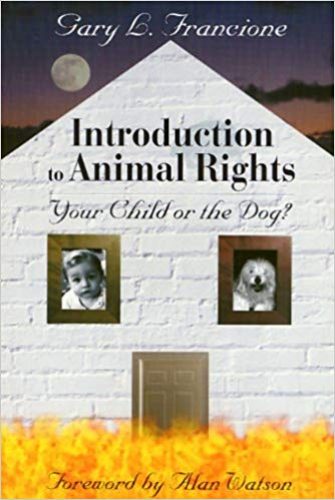
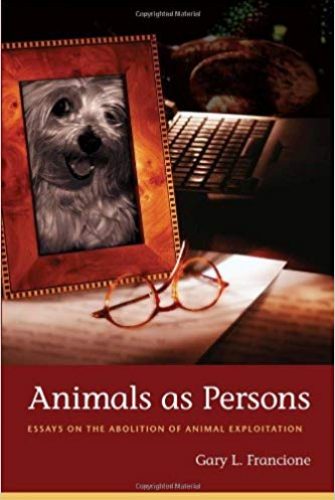
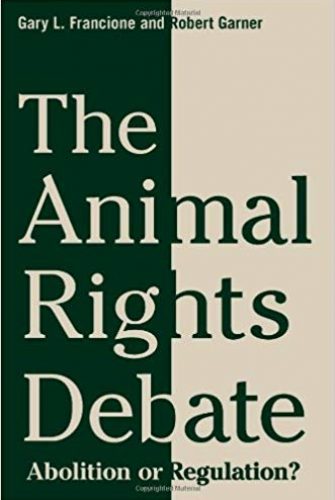
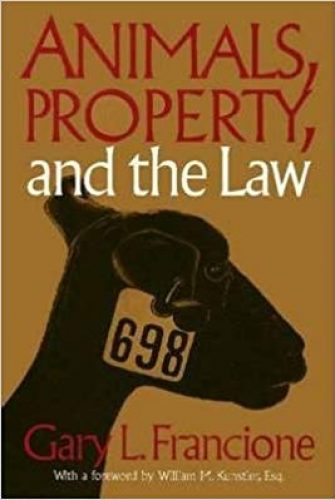
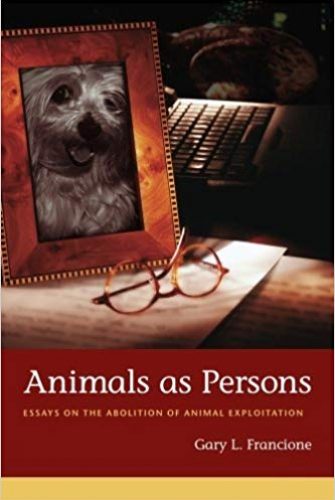
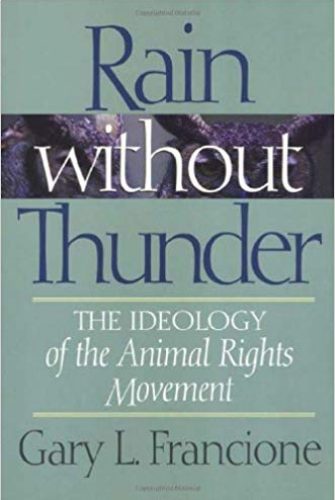
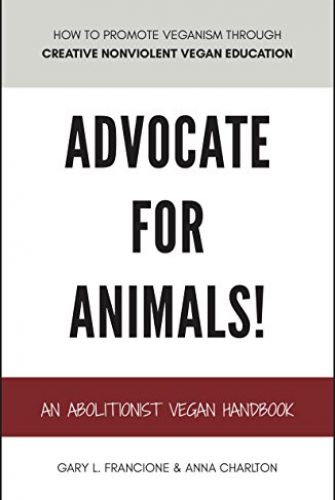
Many people assume that humans can’t live well on an exclusively plant-based diet. But this is just false. The Academy of Nutrition and Dietetics—the world’s largest organization of nutrition professionals—states that, when appropriately planned, vegan diets are “healthful, nutritionally adequate, and may provide health benefits for the prevention and treatment of certain diseases. These diets are appropriate for all stages of the life cycle, including pregnancy, lactation, infancy, childhood, adolescence, older adulthood, and for athletes.”
On the clothing front, things are even simpler. There is an endless supply of fashionable and affordable plant-based and synthetic clothing. We have no need for animal-based clothing like leather jackets and boots, and silk ties, and wool sweaters, as there are many varieties of these items that do not use animals. The same is true of personal care products (e.g., soaps and shampoos), cosmetics, and other products that often rely on animals and their bodies. There is an entire industry of plantbased and synthetic products available to vegans.
Clearly, we do not need to keep intentionally using, harming, and killing animals. The only reason we have for continuing to do what we’re doing is that we find it convenient and enjoyable. And it goes without saying that convenience and pleasure are not enough to justify the harming and killing of billions of animals. If we really believe that it is wrong to cause unnecessary harm to animals, then using and killing them for things like food, clothing, and entertainment is completely off-limits.
Cats, Pigs, Dogs, Fish
In response, you might ask whether the animals we use for food and clothing are less important than more familiar animals like cats and dogs. After all, we live with cats and dogs, but most of us don’t accept cows and turkeys into our homes. Maybe the animals we love are different from the ones we use and eat.
This line of thinking has no foundation. Pigs and fish are like dogs and cats in every morally significant way: they are thinking, feeling, aware beings who experience the world and feel pleasures and pains. The fact that many of us love and care for cats and dogs while we participate in the unnecessary use and killing of fish and pigs does not show that there is any important difference between these animals. Instead, it just proves that we are being inconsistent and failing to live up to our own values.
We can’t claim to care about animals while we are harming and killing them without good reason. If we really care as much as we say we do, then we need to become vegan.
Nature
Some people are hesitant to embrace veganism because they think veganism is unnatural. They ask: “Isn’t the human body made to consume meat? Just like lions eat gazelles, isn’t it natural for us to eat other animals? Isn’t veganism unnatural?”
It might be “natural” to eat animals. But not everything natural is morally good. For example, in nature, animals of the same species often kill each other in territorial disputes. These fights and deaths are “natural.” But this doesn’t mean it is morally acceptable for humans to kill each other over land. The fact that something occurs in nature doesn’t mean it is morally good for humans to do it.
Likewise, not everything unnatural is morally bad. For example, human innovations like modern medicine, bicycles, and computers are unnatural, but they aren’t bad. In fact, most people would say that medicine, bicycles, and computers are very good even though they are unnatural.
In short, whether veganism is natural or unnatural is irrelevant. Humans are in a unique position to know right from wrong, and we all know it is wrong to cause unnecessary harm to animals. This is all we need to know in order to see that we have to become vegan.
“Extreme” Veganism
Even after reading everything up to this point, you may still find veganism to be a rather extreme response to the moral problem we are discussing.
If veganism seems extreme, it’s only because you don’t yet know many vegans. Things we aren’t used to often seem extreme. To people living in a hot climate, the idea of going to live in a cold climate may seem extreme. And to people living in a cold climate, the idea of going to live in a hot climate may seem extreme. Of course, there is nothing truly extreme about living in São Paulo or Montreal. But changing one’s life can feel very dramatic, even when it isn’t really a big deal in the long run.
Veganism is not radical or extreme—it’s a simple and sensible response to the beliefs we already share.
“Vegetarianism” and “Humane” Animal Use
Although becoming vegan isn’t difficult or complicated, it can seem like a big change before you’ve gotten started.
You might be hesitant to do something that feels like a big change. So you may be wondering whether you could make a smaller change to your life while still doing a morally good thing. For this reason, some people consider becoming a “vegetarian” or, along the same lines, continuing to eat animal products as long as they are produced “humanely.”
Are these morally good ideas?
The Two Myths of “Humane” Animal Use
Some companies claim to produce “humane” meats, eggs, dairy, and other products, and claim to provide animals with a high standard of “welfare.” And some so-called “animal rights” groups endorse these companies and products. In light of all this, you might assume that “humane” products are morally good or at least a step in the right direction.
Despite what corporations and some advocacy groups would have you believe, “humane” animal consumption is just a myth. In fact, there are two myths of “humane” animal use.
First, it is a myth that animal agriculture can be reformed to make sure that animals are treated much better than they are currently treated. Over the last three decades, a senior law professor from the United States—Gary L. Francione—has provided substantial research showing that welfare regulation doesn’t and can’t work. In short, because animals are pieces of human property, welfare reforms will never meaningfully protect them.
Here is why: any attempt to improve how animals are treated must balance the interests of the animals against the financial interests of the businesses who own, sell, use, and kill those animals. But because animals are just pieces of property, even their most important interests—in not suffering, in living a happy life, in not being killed—will always be given very little weight in this balancing process. Attempting to balance the interests of a piece of property against the interests of the property’s owner is like trying to deal a fair hand of cards with a rigged deck: it just can’t be done. Because property owners must be able to benefit from using their property, a welfare reform won’t be put in place unless it allows animal owners to continue exploiting their animals in profitable ways.
More info
For more information on
this topic, visit the IVA website
(internationalvegan.org) and
read the position paper entitled
Why Does the IVA Not Engage
in Reform Work?
This means that when new welfare legislation is passed, and when companies adopt new “humane” standards, it does little to help animals. At most, these reforms make only minor modifications to how animals suffer and are killed, while ignoring the fundamental moral problem in our relationship with animals. No matter what reforms we put in place, animals will still have their desires and needs ignored, still be manipulated against their wills, still be made to suffer unnecessarily, and still be killed for no good reason.
While doing little to improve the lives of animals, welfare reforms also make the public feel better about using and killing animals. As animals continue to suffer and be killed in greater numbers than ever before, businesses advertise their “humane” products and consumers eagerly buy them. Instead of helping animals, these campaigns further entrench animals as commodities to be bought, sold, used, and killed.
This is the reality of animal use. As long as animals are property, it is a myth that we will treat them much better.
But there is a second myth, too, and it is even more important. The second myth is a myth about morality. In short, it is a myth that there could be such a thing as “humanely” harming and killing an animal without a good reason. Just like there is no way to “humanely” injure a cat for fun or to “humanely” swat a bird’s nest from a tree out of curiosity, there is no way to “humanely” hurt and kill animals unnecessarily.
The idea of “humanely” harming and killing an animal without good reason is nonsensical. If it is immoral to harm animals unnecessarily, then we should never do it, no matter how nicely we claim to do it.
Vegetarianism
The word “vegetarianism” is often used to refer to a diet that excludes meat but includes things like dairy, honey, and eggs. Many vegetarians also continue to use animal products like wool and silk.
Based on everything we have said so far, it is clear that vegetarianism misses the point, morally speaking. When we buy and consume things like dairy, eggs, wool, leather, or animal-based cosmetics, we are participating in a process that causes and depends on harm and killing. We owe animals much more than this. A vegetarian diet does not begin to address the moral problem in our relationship with animals. The only proper response to the problem is veganism.
Changing the World and Doing What’s Right
We treat other animals terribly and it needs to stop. Welfare reforms aren’t the solution. “Humane” animal products aren’t the solution. “Vegetarianism” is not the solution. As long as we are breeding, controlling, and harming animals without good reason, we are acting immorally and we are mistreating animals. If we want to make things better for animals, we have to completely stop using them.
Making a Difference
In the face of how much harm we are causing, it is easy to feel powerless. Some people who are attracted to veganism are hesitant to change because they think there is no point. They worry that one person could never make a difference.
You can imagine someone saying: “What does it matter whether I eat a piece of cheese tonight? The cow has already been raised, confined, and harmed. Heck, she has probably already been killed. And billions more will be killed regardless of what I do. I can’t make a difference, so why bother changing my life around?”
This feeling of powerlessness is understandable, but it is also misguided. What we do makes a tremendous difference.
What we buy and consume has a direct influence on what companies produce and sell. As more and more people decide to be vegan, we can have a profound impact on the number of animals who are raised, used, and killed. Over time, we can completely end institutionalized animal use. We have the power to change things, but only if we decide to become vegan. The collective force that will change the world is made up of individuals like you.
At the same time, if we all decide to continue using animals and animal products, then animals will continue to be subjected to unnecessary suffering and death. If individuals like you continue to use animals and animal products, things won’t change. The power and the responsibility to change the world for animals is in your hands.
“The power and the responsibility to change the world for animals is in your hands.”
Refusing to Participate in Wrongdoing
There may be some cases where a particular action might not make a difference. For example, it is possible that on occasion one could buy an animal product without directly causing any animals to suffer or die, simply because the purchase would not have any effect whatsoever on the economy or animal use. But this is no excuse for participating in animal use. Even in these cases, it would still be immoral and unjustifiable to buy or use the animal product. To see why, just consider an analogy.
Imagine that an innocent being is going to be publicly killed in your community. Whether you show up and participate in the killing will make no difference, because they will experience the same horrible suffering and death regardless of what you do. If you stay home, it won’t make a difference. If you show up and join in the killing, it also won’t make a difference.
More info
For more information on this
topic, visit the IVA website
(internationalvegan.org)
and read the position
paper entitled
Is It Always Wrong
To Consume Animal Products?
Even if it wouldn’t make a difference, it would still be very wrong for you to participate in the killing. To do what’s right, you have to refuse to participate in the immoral activity, even if your participation wouldn’t change anything. We can’t get off the moral hook just because other people are also doing the wrong thing.
The important point here isn’t that eating a piece of cheese is as bad as participating in a group public killing. The point is that participating in something immoral is wrong even if your participation doesn’t make a difference to the outcome.
In most cases, your actions as a vegan make an important difference. Being vegan reduces demand for animal products and directly assists in ending institutionalized animal use. But even in the cases where it wouldn’t make such a difference, we still have to do what’s right. We are obligated to be vegan and to take a principled stand against using, harming, and killing animals.
Next Steps
We have discussed many issues in the last few pages. But the conclusion is short and sweet: we should all become vegan and commit to no longer using animals.
Thankfully, becoming vegan is simple and rewarding. It’s a change you can make today. Once you’ve made the commitment, you won’t look back.
In the rest of this booklet, we will offer some hands-on, practical advice for becoming vegan. We’ll talk about nutrition, meal planning, and some of the other practical aspects of making the change. Toward the end, we will offer a few words about where you might like to direct your energies once you have become vegan.
We realize that this booklet may leave you with dozens of unanswered questions: about morality, about the ins-and-outs of farming and slaughtering animals, about how the world will change over time (and whether it will change), about how to speak with your family and friends about veganism, about whether being vegan means being an “activist,” and a whole lot more.
Each of your questions deserves a response, but we can’t answer them all right here. If you have questions, we hope that you’ll visit us at internationalvegan.org and reach out to us at info@internationalvegan.org. Our team of volunteers is excited to answer your questions and help you in your transition.
This page is a reproduction of a section of the booklet Vegan Starter Kit: Respecting Animals Means Going Vegan published by the International Vegan Association. Images and formats might differs from the original booklet.
The arguments and ideas in the booklet are based on the work of Prof. Gary L. Francione. Learn more at abolitionistapproach.com and howdoigovegan.com.
The Vegan Starter Kit: Respecting Animals Means Going Vegan booklet is published by the International Vegan Association. Readers are welcome to reproduce articles from the original publication in their entirety and with attribution for personal or educational use without additional permission. Material may not be reproduced for resale without prior arrangement with the IVA. © International Vegan Association, 2017. For additional resources or to contact the IVA, visit internationalvegan.org.
This work is licensed under a Creative Commons Attribution-NonCommercial-NoDerivatives 4.0 International License. ![]()
